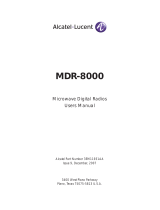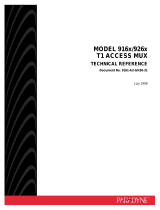Page is loading ...

JOBAID
61410105L2-22A
9911
TROCU DP
DE-4E
CLEI: D4D3MS2D _ _
STATUS LEDs
NO SX ●● OFF Sealing current has been detected
● RED No sealing current detected between the TROCU DP and
the TR DDS-R unit
SYNC LOSS ●● OFF Synchronization with TR DDS-R
● RED No synchronization with TR DDS-R
NEAR CRC ● RED CRC errors detected by the TROCU DP from the 2-wire
loop
FAR CRC ● RED CRC errors detected by the TR DDS-R from the 2-wire loop
QM DISC ● RED Customer transmit signal has been disabled due to errors
on the loop, only when QM option is enabled
NO DSU ● YELLOW Customer DSU/CSU is absent as determined by the
TR DDS-R
LBK ● YELLOW OCU or CSU loopback activated
IDLE ● YELLOW Presence of the control mode idle toward the
network
FACEPLATE SWITCHES
■ SC (Secondary Channel) may not be selected
if circuit is SW56 or 64 kbps.
■ Only one data rate can be selected.
CIRCUIT BOARD SWITCH - SW1
Quality Monitor (SW1-1)
■ TROCU DP monitors incoming 2-wire loop and 4-wire customer interface
data for errors. Customer transmit data may be ignored if errors are
excessive.
AB Signaling (SW1-2)
■ This switch is typically OFF to allow the
unit to search for frames containing
signaling bits. When ON, the TROCU
DP will take its signaling from the
backplane of the channel bank.
Note: Only applicable for SW56 applications
PREPROVISIONED PARAMETERS
Zero Code Suppression
■ Ensures pulse density in the T-carrier data stream. This option should be disabled for
64 kbps circuits and enabled for all others.
Latching Loopback
■ Unit automatically responds to OCU and CSU latching loopback sequences.
BANTAM JACKS
NEAR and FAR logic level Bantam test access jack. These test points are intrusive into the
data stream.
Note: These jacks are for TPI 108/109, FIREBERD 6000 or other DS0 level test set.
COMPLIANCE CODES
This product complies with UL 1459, third
edition. It is intended to be installed in an
enclosure with an Installation Code (IC) of “B”
or “E” and in Restricted Access Locations only
WARRANTY
Warranty for Carrier Networks products manufactured by ADTRAN and supplied under
Buyer’s order for use in the U.S. is ten (10) years. For a complete copy of ADTRAN’s
U.S.
and Canada Carrier Networks Equipment Warranty
: (877) 457-5007, Document #414.
SW1
QUALITY MONITORING
AB SIGNALING
For a complete Installation and Maintenance Practice faxback: (877) 457-5007, Document #375. Please have your fax number available.
TROCU DP DE-4E
C A U T I O N
C A U T I O N
!
SUBJECT TO ELECTROSTATIC DAMAGE
OR DECREASE IN RELIABILITY.
HANDLING PRECAUTIONS REQUIRED.
Code Input Output
Power Code (PC) F C
Telecommunication Code (TC) – X
Installation Code (IC) A –

INSERTION LOSS MEASUREMENTS
TR DDS Design Limits at Traditional 4-wire Frequencies
The table below is for comparison only. The TRDDS system
operates at 13.3 kHz for all customer data rates.
2.4 1.2 21
2.4/SC 1.6 23
4.8 2.4 27
4.8/SC 3.2 30
9.6 4.8 35
9.6/SC 6.4 39
19.2 9.6 45
19.2/SC 12.8 50
56 28.0 59
56/SC&64 36.0 61
DEPLOYMENT GUIDELINES
■ All loops must be nonloaded.
■ Actual Measured Loss (AML) should not exceed
50dB at 13.3 kHz (135 ohm termination), the Nyquist
frequency of TRDDS.
■ Loop length should not exceed 50 kft.
■ Product is designed to be bridged tap (BT) tolerant.
ADTRAN allows for 12 kft of BT, though further testing
has shown no degradation up to 18 kft.
■ Background noise level should not exceed 34 dBrn.
■ Impulse noise should not exceed –40 dBm, (+50 dBrn).
■ Maximum cable lengths (6dB margin still available)
50 kft of 22 gauge, 36 kft or 24 gauge, 27 kft of 26 gauge.
TROCU DP WIRING CONNECTIONS
T/R 3/4
TRDDS-R CONNECTIONS
To/From Network TT,TR 41,47 –
To Customer DRT, DRR 5,15 7,8
From Customer DTR,DTT 49,55 1,2
TOTAL REACH DDS
Turn-up Guide
1. Set dipswitches on both units according to circuit design and local practices.
2. Install TROCU DP and TRDDS–R.
a) TROCU DP fits in DE and DE-4E channel bank.
b) TRDDS–R fits in standard non-powered T200 or T400 NCTE mounting.
3. See reverse side of this job aid to ensure all LEDs are correct and synchronization has occurred.
a) TROCU DP DSU LED will be illuminated yellow if customer DSU is not connected. No other LEDs should be illuminated.
b) TRDDS–R SYNC LED (green) and appropriate data rate LED will be illuminated. No other LEDs should be illuminated.
4. If LEDs in step 3 are as noted, proceed with loopback and BERT testing per DDS specifications.
5. If LEDs in step 3 are in any other configuration, see troubleshooting portion of this job aid.
6. If problem cannot be solved via the job aid, please call technical support for assistance (see number in page header).
7. The TRDDS system will be qualified at the 13.3 kHz frequency for all customer data rates.
Troubleshooting Guide
No Power at the TRDDS-R
■ Ensure TROCU DP is supplying necessary voltage to power the TRDDS–R. Measure t-r voltage at the frame (tip to ground = –125 to –130 VDC,
tip to ring = –125 to –130 VDC, ring to ground = 0). The TRDDS system is not polarity sensitive.
■ Measure t-r voltage at the TRDDS–R.
■ If voltage is not present at the TRDDS–R, check continuity of cable pair.
■ If voltage is measured at the TRDDS–R, replace the unit.
■ The TRDDS-R does not place a measurable short between tip and ring. Cable resistance must be taken towards a manually applied short.
Power, but no Synchronization
■ Check cable for load coils.
■ Note signal meter reading on TRDDS–R during power up and synchronization process. Refer to "Signal Loss Indication" portion of this job aid
for definitions. Loop loss may be too great for synchronization to occur. Ensure loop length is within allowable deployment guidelines.
■ Check for excessive bridged taps.
Excessive Errors on Loop
■ Ensure background noise does not exceed 34 dBrn.
■ Ensure impulse noise is not greater than –40 dBm (+50 dBrn). Note: measure noise with 50 Kbit filter.
■ Compare resistances of individual conductors. If these are different, high-resistance or intermittent opens may be indicated. A TDR is comonly
required to find such faults.
Testing Guide
1. Connect the DS0 digital test set (TPI 108/109 or equivalent) to the logic level bantam test jacks of the TROCU DP and configure the set for
NEAR or FAR Logic (NEAR test towards the customer loop, FAR test towards the T-carrier) and select the desired data rate. Please note,
remote testing is also acceptable.
2. Initialize the desired loopback (OCU or NIU). If FAR direction is selected, send appropriate latching loopback sequence which will loop the
unit directly across the T-carrier system. If the NEAR direction is selected, the OCU latching loopback sequence will loop the unit directly
connected to the portable test set. The TROCU DP will always invoke a bi-directional loopback.
3. The LBK LED will illuminate if the OCU or CSU loopback is successful. It will not illuminate if the loopback failed.
4. Send and receive test pattern 2047 to the established loopback and observe the DS0 digital test set for bit error count.
5. Drop OCU latching loopback and send an NIU loopback sequence to loopback the TRDDS-R. Run test pattern and observe bit error count
as in step 4 to test integrity of local loop.
6. Testing from the TRDDS–R may be accomplished by connecting the DS0 digital test set to the customer-side jack of the TRDDS–R housing and
running to a bi-directional TROCU DP loopback. Unseat and reseat the Total Reach DDS Remote unit before testing to gain access to the
data system.
Customer
Rate
4-wire Qualifying
Frequency (kHz)
TRDDS Loss
Limit (dB)
Pair
Terminal
Designations
T400
PIN#
Customer
RJ-48
TIN Designations
Backplane PIN#
PRICING AND AVAILABILITY 800.827.0807
TECH SUPPORT 800.726.8663
RETURN FOR REPAIR 256.963.8722
www.adtran.com
61410105L2-22A
/

